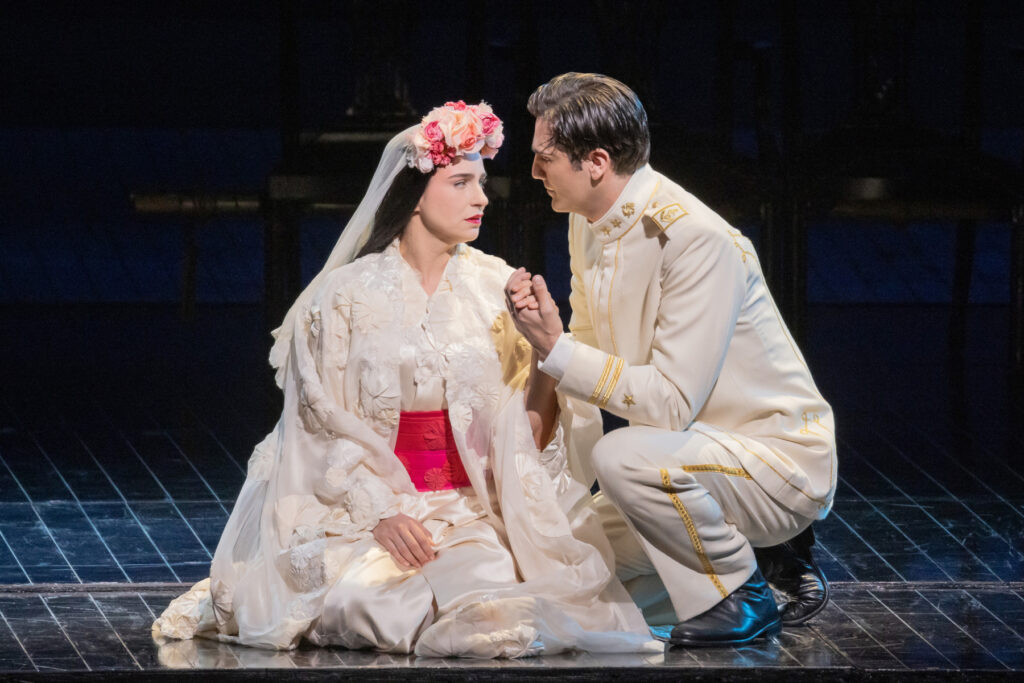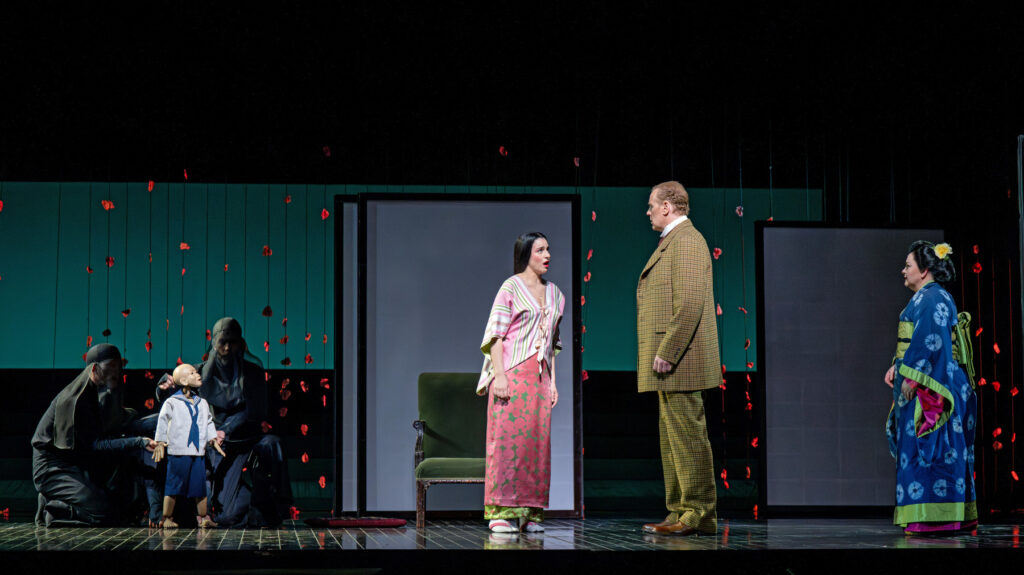Madama Butterfly is firmly ensconced among the top-ten “most performed” operas worldwide and the Met’s current production is nearly two decades old. Yet, over the past few weeks, the Met debut run of the Lithuanian-Armenian soprano Asmik Grigorian in its title role of Cio-Cio-San packed the house night after night. Since a breakout performance five years ago at the Salzburg Festival as Strauss’s Salome – a role she will repeat at the Met next season – she is a marquee name.
Few operas demand more of a single singer: Cio-Cio-San is on stage almost uninterrupted for two-and-a-half hours, during which time she traverses a tragic emotional arc through wonder, discovery, anger, courage, resignation, and despair. Grigorian’s characterization is neither as melodramatic nor as stereotypically “Japanese” as many: she neither exaggerates Cio-Cio-San’s childish timidity at the start, nor her raging distress at the end. She presents a modern woman straightforwardly coping with adversity. Yet the result is moving.
Grigorian’s real strength lies in vocal production. The daughter of two opera singers, she possesses a rare instrument that suits Puccini’s (and Strauss’s) doomed teen well: her voice is exceptionally focused with a timbre of youthful clarity and just a bit of edge, produced without strain, perfectly in tune, and capable of flexible phrasing, color and affect – not least many lovely floating A’s and B-flats. (The night I attended, only one optional D-flat went awry.) If early 78 recordings are a fair representation, notable singers of this role in Puccini’s day sounded similar.

Grigorian is not always as scrupulous or creative as she might be in observing Puccini’s vocal micro-notations, or as poignant as some of her illustrious predecessors in this role. Yet her distinctive vocal color remains consistent and distinctive from top to bottom, whether at a whispered -pianissimo or a fortissimo that punches through a full-throttle orchestra. This slightly restrained vocalism maintains the impression of a single dramatic character throughout the evening. The overall result is as compelling as anything one is likely to hear today.
As the American sailor Pinkerton, Cio-Cio-San’s unfaithful husband, Chilean tenor Jonathan Tetelman cuts a dashing stage figure. He hits the notes, and a few of the high ones elicited spontaneous cheers in mid-phrase – a habit that has gone almost extinct since the “golden age” decades ago when numerous viscerally thrilling tenors populated the Met stage. Mostly, however, Tetelman tends to be tiresomely loud and brassy, especially in the upper register. In the love duet and elsewhere, he runs roughshod over Grigorian’s more nuanced singing, the voice hardening where it should warm.
One might be tempted to ascribe such persistent brassiness to the allergies that led Tetelman to cancel the immediately preceding performances, but for the fact that he sounds similar on his recent Deutsche Gramophon recordings. (A note for those who only heard this run on the radio or in a cinema: recording engineers, ever more active behind the scenes in Met broadcasts, “equalized” away Tetelman’s wearyingly high volume – and with it, the occasional thrilling moments – but did little to alter his monochromatic timbre.) Still, an isolated but deft first-act diminuendo makes one wonder if this is more a questionable interpretive choice on his part than a technical limitation. With more ingratiating suppleness, he could be a tenor of greatness.
Pennsylvania-born mezzo Elizabeth DeShong seems to own the role of Suzuki at the Met these days – as she should. From resonant lows to shimmering highs, hers is a wonderful voice. Better yet, she offers an entirely believable traversal of Suzuki’s act-by-act emotional evolution – parallel to that of her mistress – from quiet respect to loyal concern to passionate despair.

The avuncular warmth, volume, and dramatic verisimilitude with which baritone Lucas Meachem portrays US Consul Sharpless is equally convincing. Veteran character tenor Tony Stevenson adds an appropriately sleazy marriage broker Gozo, and South Korean bass-baritone Jeongcheol Cha a convincingly frustrated suitor Prince Yamadori – with only slight strain at the highest point. The women’s chorus sings sweetly at Cio-Cio-San’s entrance.
Xian Zhang, the Chinese-born conductor of the New Jersey Symphony, made her Met debut alongside Grigorian. In an era when opera conducting has grown slow and heavy, what a pleasure to hear the fleet tempos, lilting rhythms, idiomatic rubato, and a lusciously light string tone of classic Italian opera orchestra. Zhang seems to have internalized completely that much of Madama Butterfly, despite its orchestral originality,is very lightly scored. Overall, this is the most compelling conducting I have heard in the Italian wing of the Met since Fabio Luisi departed.
Anthony Minghella’s minimalist production, now a modern Met classic, is striking and at times quite beautiful. It deftly deploys sliding shoji screens to construct distinct spaces. Using a Bunraku Puppet as Cio-Cio-San’s child (operated by black clad puppeteers) is inspired; the dream sequence in which Cio-Cio-San encounters a Doppelgänger puppet is not.
Yet this aestheticized approach comes at a cost. The staging does not convey the ever more claustrophobic intimacy of Cho-Cho-San’s little house – a metaphor, surely, for her own psychic circumstances. Nor does it convey the Japanese cultural context of her suicide, politically fraught though doing so might be these days. And the stagy portrayal of Cio-Cio-San’s death is off-putting: she wanders upstage inexplicably, away from the audience and sits on a bare expanse of shiny black flooring, while dancers symbolize her suicide while wrapping her in red cloth. The multi-media gut punch that should end this opera was vocal, but not visual.
Andrew Moravcsik
Madama Butterfly
Music composed by Giacomo Puccini
Libretto by Giuseppe Giacosa and Luigi Illica, based on the play by David Belasco
Cast and production staff:
Asmik Grigorian – Cio-Cio-San; Jonathan Tetelman — Lt. B. F. Pinkerton; Elizabeth DeShong – Suzuki; Lucas Meachem – U.S. Consul Sharpless; Tony Stevenson – Goro; Paul Corona – Imperial Commissioner; Christian Jeong – Registrar; Robert Pomakov – Bonze; Jeongcheol – Prince Yamadori; Briana Hunger – Kate Pinkerton.
Metropolitan Opera Xian Zhang – Conductor; Anthony Minghella – Production; Blind Summit Theater – Puppetry; Han Feng – Costume Designer; Paula Williams – Revival Stage Director.
Metropolitan Opera Orchestra. Metropolitan Opera Chorus.
7 May 2024
Top Image: A scene from Puccini’s Madama Butterfly (Photo by Richard Termine / Met Opera)